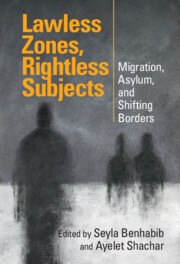Acknowledgments
Like the intellectual terrain that this volume covers, this book has transnational origins. It started during the deep months of the COVID-19 pandemic with a Zoom call between Seyla Benhabib and Ayelet Shachar, the editors of this collection of essays, who passionately discussed their shared interest in the new reconfiguration of territory, rights, and jurisdiction that is taking place, often rendered invisible by everyday politics surrounding the transnational movement of peoples. We had both just published independent works on these topics and were eager to further explore their implications for democratic governance, human rights, and contemporary debates on justice. And thus, in that spaceless virtual moment, emerged the idea of bringing together an interdisciplinary group of participants to shed light on the various legal, political, philosophical, and critical dimensions of these pressing developments.
The essays collected in this volume are the result of this initiative and two formative conferences convened by Professors Seyla Benhabib and Ayelet Shachar. In spring 2021, our first conference was held virtually under the joint auspices of Columbia University Law School and the Harney Program in Ethnic, Immigration and Pluralism Studies at the Munk School of Global Affairs and Public Policy, University of Toronto. A year later, from June 30 to July 1, 2022, the group convened in person in Frankfurt for a two-day workshop that was organized by the Transformations of Citizenship Leibniz Prize Research Group, generously funded by the German Research Foundation (DFG). Directed by Ayelet Shachar, this research group is housed at the Normative Orders Research Centre in the elegant Westend Campus of Goethe University Frankfurt. For many of us, this was our first in-person academic meeting since the lifting of pandemic-era border restrictions. The discussions were, accordingly, intense, engaging, and thought-provoking. We hope that our readers, too, find the essays illuminating and important as we seek to navigate some of the most burning issues of our time that have given rise to populist anger against migrants and refugees.
We would like to thank several individuals and institutions for their invaluable support. In convening the virtual conference, Dylan Glickel of Columbia Law School along with Marie-Eve Loiselle and Gözde Böcü of the University of Toronto’s Harney Program in Ethnic, Immigration and Pluralism Studies provided vital assistance and an abundance of creativity. Sonja Sickert, Michael Graf, and Rebecca Schmidt of the Normative Order Research Centre at Goethe University Frankfurt provided superb administrative support. Benjamin Boudou, then a senior research fellow with the Transformations of Citizenship research group and now a professor of political science at the University of Rennes, was indispensable to the coming together of the Frankfurt Conference. Lilith Mackenberg and Eva-Maria Schäfferle, both longstanding members of the Transformations team, were a joy to work with; they took the lead in preparing the bibliography. Gilad Padva provided excellent indexing services and Jennifer McBride of the University of California, Berkeley, School of Law, stepped in at the eleventh hour to assist with the production process. Marie-Eve Loiselle lent her keen artistic eye to assist with selecting the volume’s cover image. At Cambridge University Press, we benefited considerably from working with John Haslam, Executive Publisher, Social Sciences, and his proficient editorial team, especially Carrie Parkinson. Lastly, this volume would not have come about without the resolute commitment and wisdom of our colleagues, Professor Rainer Forst of Goethe University Frankfurt, Professor Ran Hirschl of the University of Toronto, and Professor Gillian Lester, Dean of Columbia Law School, who believed in this project even when it seemed implausible to lift it off the ground. We are both immeasurably grateful for their foresight.
All essays are original contributions and have not appeared previously.

